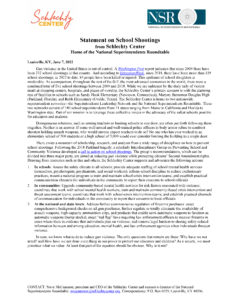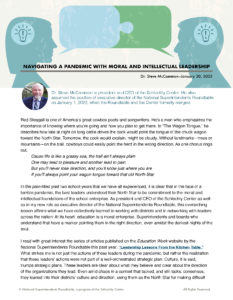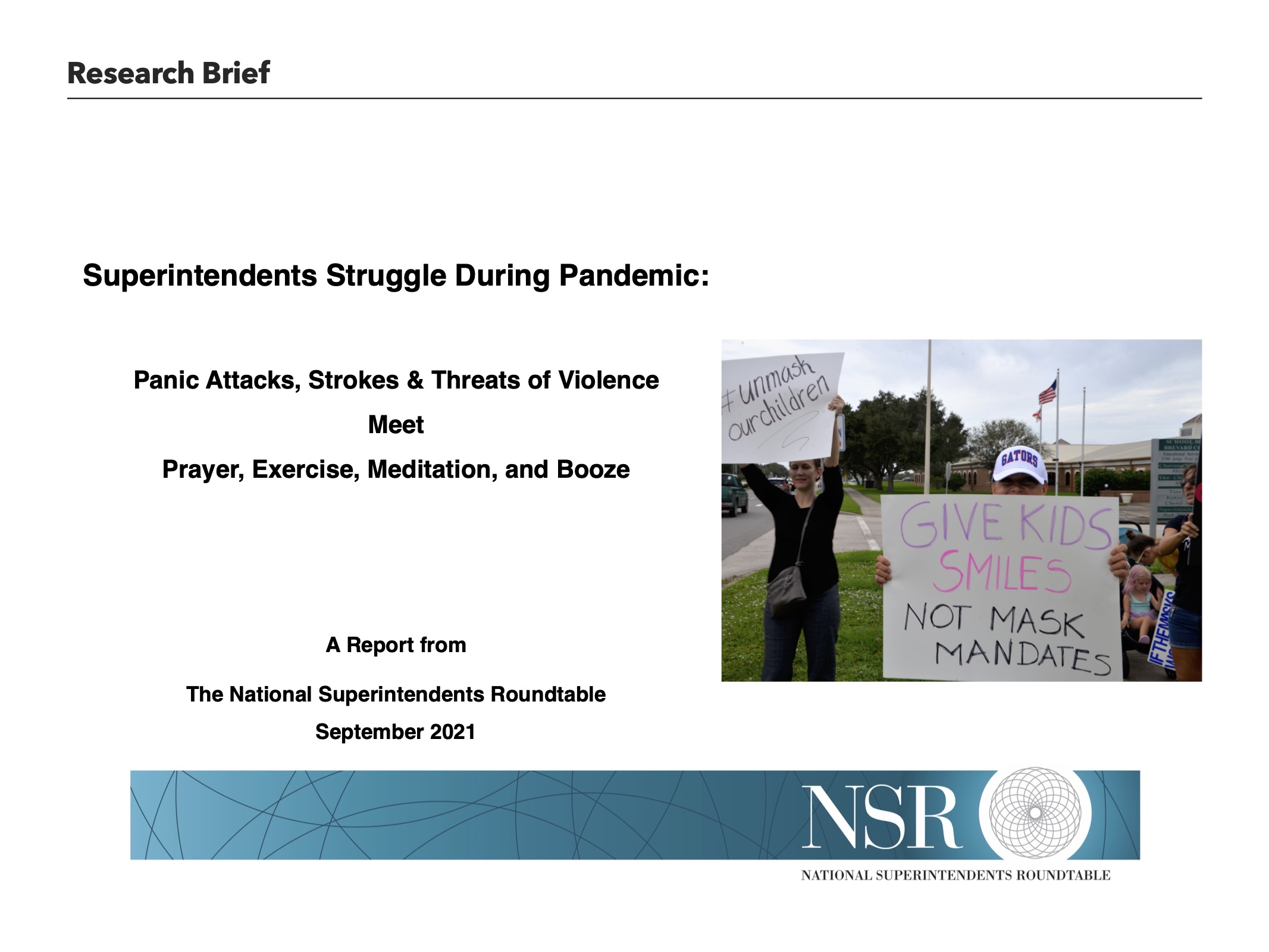Amidst growing concern about the difficulties of the national economy, how can school leaders construct a sense of optimism about the future? Where can we find new sources of inspiration? In Finland? In France or England? How about Malawi, a poverty- and famine-stricken African nation?
Think we have it bad now? Things were much worse during the Great Depression, reported Bill Purcell, former mayor of Nashville and former director of the Kennedy School’s Institute of Politics. And they were even more uncivil during the 1960s, said John Brademas, a 20-year-veteran of Congress and president emeritus of New York University.
Both preached a politics of hope in an era of austerity and reported that the public respected educators, understood the centrality of education for the nation’s hopes, and looked to superintendents for leadership.
Finally, turn to Finland and Malawi for guidance and inspiration. In Finland, trust is the glue that holds together a school system that consistently produces 15-year-olds who lead the world on assessments by the Program on International Student Assessment (PISA). And in Malawi a 14-year-old boy became a global inspiration by harnessing the wind with a windmill built out of junk and scrap to help his family survive a famine.
Where Have the Happy Days Gone?
Referring explicitly at one point in his presentation to Franklin Deleanor Roosevelt’s campaign song, “Happy Days Are Here Again,” former Nashville mayor Bill Purcell set out to explore where the “happy days” in American education have gone and how better times might return. He reported that his first day in the Tennessee state legislature decades ago was consumed with a debate about where to place the snack bar. He had been hoping for an exploration of the great issues facing the Volunteer State. “Even worse, the majority whip was in jail.” Politicians, he noted, had long been held in disrepute. Aristophanes once observed “Under every stone resides a politician.”
Nevertheless, three years after his disappointing introduction to policymaking in Tennessee, the legislature had enacted the biggest education reform in generations, a significant health care overhaul, and put in place new ethical safeguards for better government. Despite the shallowness and puffery that surrounds politics, was Purcell’s message, “all of us have been uplifted and educated by this apparently self-absorbed system.”
Purcell, who after leaving elective office served as director of a Vanderbilt University center on children and families and as director of the Harvard Kennedy School’s Institute of Politics, reviewed a catalog of 20th century political horrors, including Vice President Nixon’s political slush fund, the McCarthy Era in the 1950s, the assassinations of John F. Kennedy and Martin Luther King, Jr. in the 1960s, and the impeachments of President Nixon in the 1970s and President Clinton in the 1990s. Despite all that, Americans had endured and prospered.
One notable development during the last 80 years, he argued, was the strengthening of effective local government. “Almost 80 years ago, the president of Harvard debated my predecessor as mayor of Nashville. President Eliot argued that the idea of sovereignty and power at the municipal government level was archaic. He condemned Boston’s city government, convinced it should be weakened.” In the intervening decades, noted Purcell, cities declined and have been restored. “The restoration came about because of people’s expectations and the willingness of public servants to meet those expectations.”
Education as the Most Important Thing We Do. “In my first campaign for mayor of Nashville, I campaigned on a platform that education is the most important thing we do,” said Purcell. “Most people still believe that. And most politicians who understand what is going on in the world understand that too.” Taxes, he acknowledged, are “toxic.” But, he said, that’s nothing new. “They always have been. If you don’t believe that, look at Luke 18:9-14, in which the pharisee, convinced of his own virtue, condemn a humble tax collector.” But, he said, “I was able to raise taxes twice, because in the end, the public always comes through.”
Purcell closed by arguing that the public will increasingly turn to educators as the experts on what to do about schools. “I don’t underestimate the challenges, but right now people believe education is critical. They know it is an important element in how we respond to challenges of jobs, crime, and sustaining a democratic way of life. No one is satisfied with our schools — nor should they be, nor should we want them to be.”
However, he continued, “Although 20 years ago people thought they knew what to do about the schools, that is no longer true. They don’t believe anyone outside the schools really knows. So it comes back to the people in this room. You are the experts; you are the only people in authority who can fill this vacuum, which otherwise will be filled with uncivil and bitter words, whether that’s the Tea Party of today or the Fr. Coughlin’s of yesterday.” Newspapers, he said, are at a loss. People are still bowling alone. “The Gallup Poll recently found that people ignore the front pages and head straight to the sports section.”
“No one is better equipped to fill this void than you are. People across the board respond to you and they want expert contributions to this debate. Bring the mayor and the county council along. Bring the governor along. You have an opportunity in front of you today that no superintendents have ever had before.”
However, he continued, “Although 20 years ago people thought they knew what to do about the schools, that is no longer true. They don’t believe anyone outside the schools really knows. So it comes back to the people in this room. You are the experts; you are the only people in authority who can fill this vacuum, which otherwise will be filled with uncivil and bitter words, whether that’s the Tea Party of today or the Fr. Coughlin’s of yesterday.” Newspapers, he said, are at a loss. People are still bowling alone. “The Gallup Poll recently found that people ignore the front pages and head straight to the sports section.”
“No one is better equipped to fill this void than you are. People across the board respond to you and they want expert contributions to this debate. Bring the mayor and the county council along. Bring the governor along. You have an opportunity in front of you today that no superintendents have ever had before.”
Reflections of a Public Man: “Mr. Education”
During the meeting, the Roundtable presented Dr. John Brademas, a 20-year veteran of the United States House of Representatives and President-Emeritus of New York University, with an award for a “lifetime of contributions to American education and to the American people.” The citation described Brademas as a “a vital figure in American life with a vision that all citizens in a democracy deserve to be treated with dignity and respect.” His work, the citation read, “had touched the lives of literally tens of millions of people.”
Brademas, whose legislative accomplishments in sponsoring the Elementary and Secondary Education Act, the Higher Education Act, Public Law 94-142, and other legislation had earned him the nickname of “Mr. Education” on Capitol Hill, responded to the award with a ringing affirmation of the central importance of education and of restrained but strategic government initiatives in American life.
During the meeting, the Roundtable presented Dr. John Brademas, a 20-year veteran of the United States House of Representatives and President-Emeritus of New York University, with an award for a “lifetime of contributions to American education and to the American people.” The citation described Brademas as a “a vital figure in American life with a vision that all citizens in a democracy deserve to be treated with dignity and respect.” His work, the citation read, “had touched the lives of literally tens of millions of people.”
Brademas, whose legislative accomplishments in sponsoring the Elementary and Secondary Education Act, the Higher Education Act, Public Law 94-142, and other legislation had earned him the nickname of “Mr. Education” on Capitol Hill, responded to the award with a ringing affirmation of the central importance of education and of restrained but strategic government initiatives in American life.
“I have long believed that educators are among the great heroes of our country,” said Brademas, the son of a teacher and grandson of a high school superintendent. After reviewing his sponsorship of most of the major education legislation of the last half of the 20th century, he took issue with the governing sentiment of the last 30 years. Defeated in his campaign for re-election in the 1980 Reagan landslide victory over President Jimmy Carter, Brademas was dismayed to hear President Reagan declare in his inaugural address, “Government is not the solution to our problem. Government is the problem.” Brademas thought that to be a clever political slogan, but a very dangerous idea and the source of much of the partisan deadlock that characterizes politics today.
Painting a picture in broad strokes of the history of successful government efforts to build a nation during the 19th and 20th centuries, Brademas argued that leaders who believed in restrained but effective government had built roads, railroads, airports, schools, colleges and universities, and the internet not only to promote commerce and industry but to provide for the common good. Twice in my lifetime, he said, government saved Wall Street from itself.
Schools and the moral arc of American history. They did so, he argued, because they “recognized Martin Luther King’s prophetic insight: ‘The moral arc of the universe is long, but it bends toward justice.’ “
“Schools and colleges and universities are part of the moral arc of American history,” he continued. “They have slowly — but steadily and surely — bent this nation toward justice.”
In 1936, he said, President Franklin Deleanor Roosevelt, put forth a famous challenge to the citizens of the United States. FDR declared that “This generation of Americans has a rendezvous with destiny.”
“I believe,” said Brademas, that “Our generation has such a rendezvous, too. — and as we approach that rendezvous, I want you to be of good cheer. I for one am confident that, if we keep faith with the better angels of our nature, our rendezvous with destiny will confirm that America’s best days still lie ahead.”
“What is clear to me,” he concluded, “is the following: The success of this generation of Americans in meeting the challenges ahead will depend intimately on the quality and strength of our nation’s schools — and on the sense of decency and values that the men and women in our classrooms transmit to our children.”
Finland and Harnessing the Wind
The meeting concluded with two sources of inspiration. The first was a viewing of the film, The Finland Phenomenon, a documentary outlining how a commitment to trust throughout its schools has permitted Finland to develop an educational system that consistently leads the world when 15-year-olds are administered the Program on International Student Assessment (PISA).
The Roundtable will visit Finland, along with France and England, in June 2012 to explore European approaches to organizing national education systems. Each nation offers a different mix of policies and approaches. Finland emphasizes local control and administers no assessments until students are ready to graduate from high school. France has long had a top-down approach to education and a program of quite rigorous assessments. England has moved increasingly in recent years to encourage charter-like schools, along with assessments that rank schools. In each country, the Roundtable will meet with government leaders and visit local schools.
The second was presented by host Mort Sherman, superintendent of Arlington City Schools. Sherman introduced the Roundtable to the extraordinary story of William Kamkwanda, a 14-year-old boy from Malawi. The author of the best-selling The Boy Who Harnessed the Wind, Kamkwanda has become a global inspiration featured on TED talks and The Daily Show for his efforts to harness the wind with a windmill built out of junk and scrap to help his family survive a 2005 famine. Alexandria schools are using the text as required reading in the middle and high school years and has even launched a community conversation around it.
The point, said Sherman, is that we need to ask ourselves some tough questions: With all of our resources, why don’t we have more stories like Kamkwanda’s in this country? What are we doing in our schools to dampen the drive and creativity that this boy from Malawi demonstrated? How many young people capable of harnessing the wind are we ignoring in our classrooms? How can we encourage our teachers to help their students harness the wind? And how can we help our teachers harness the wind themselves?
Good questions all, and questions that the Roundtable hopes to encourage its members to explore.





